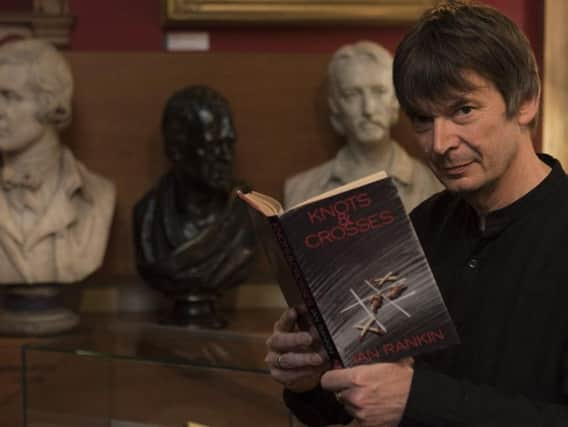Ian Rankin says he knows he may be "outlived" by Inspector Rebus


The author has admitted he is growing used to the idea of the character being “revivified” by another writer after he passes away - even if he kills Rebus off.
Speaking at the Writers’ Museum, during a visit to oversee final preparations for a special 30th anniversary exhibition of his own Rebus memorabilia, Rankin said he would be “flattered” if Rebus lived on.
Advertisement
Hide AdAdvertisement
Hide AdRankin has warned his fans that “the clock is ticking big time” for Rebus and that the time will come for the character when he decides “enough is enough.”
In Rankin’s own guide to the exhibition, which has been staged to coincide with the first ever “RebusFest” this weekend, he states: “There’s never been a plan for the Rebus series, and I don’t know what Rebus’ future is. I think there’s a little bit of unfinished business and as long as I can say that at the end of each book, great.
“But I am up against this problem that he is getting older and I cannot conceive of him in a care home whizzing around in an electric wheelchair, solving the case of the missing soft-boiled egg, so there must be an end point, but I don’t know what that end point is yet.
“We know this about fictional detectives: he might well outlive me. I mean people are still writing about Sherlock Holmes. People keep re-imagining Jekyll and Hyde, generation after generation, so who knows, when I’m gone maybe Rebus will be revivified by some other writer. I’ve got that to look forward to. Me being dead and my character still being alive.”
Rankin has decided against publishing a new Rebus thriller to mark the 30th annniversary and insists he has no definite plans to return to the character.
He added: “You can’t really kill off a fictional character. Folk will bring him back. It’s quite flattering if like your character enough to keep writing or reading about them or watching them on TV. If I knew I was finished with Rebus I’d say so. But I don’t think I have. I’ve not found out everything there is to know about the guy. Maybe I never will.”
Meanwhile the exhibition recalls the big break that paved the way for one of Scotland’s most celebrated literary creations.
Advertisement
Hide AdAdvertisement
Hide AdRankin was a PhD student at Edinburgh University in 1983 when he submitted a short story to The Scotsman, sister paper of the Evening News, for a competition. Second place was enough to see it appear in print - sparking a chain of events which led to the publication of the first Rebus novel.
Now the story, The Game, about two factory workers who were laid off on the same day, has seen the light of day again. It has been given pride of place at the Writers’ Museum in Edinburgh along with a host of other material from the author’s personal archives.
Rankin said: “I couldn’t honestly tell you where The Game came from. It was about two guys who were laid off from the same shipyard in the same day. One of them was management and the other one was a welder. They meet up at a snooker hall and have a brief conversation about what it means to them. That was it.”
Other highlights include a letter from Rankin’s agent telling him the first Rebus novel had been rejected by five publishers, and the original manuscript for the book, Knots and Crosses.
The exhibition reveals the deal to publish the first book was worth £1500, that Rebus was nearly relocated to London and played by Eastenders star Leslie Grantham on TV, and that the character was initially killed off in the first book.
The exhibition, which features some of Rankin’s earliest interviews and reviews, has been staged to coincide with the first ever “RebusFest” - three days of talks, workshops, tours and film screenings.
Rankin had just started his PhD into the work of Muriel Spark when his first ever story was published in September 1983. It was to help his work catch the eye of his first editor, Euan Cameron, who offered Rankin a publishing deal for Knots and Crosses.
Advertisement
Hide AdAdvertisement
Hide AdHe said: “I couldn’t honestly tell you where The Game came from. It was about two guys who were laid off from the same shipyard in the same day. One of them was management and the other one was a welder. They meet up at a snooker hall and have a brief conversation about what it means to them. That was it.
“ It was the first short story that made me any money. It was phenomenal to see it published. I had just started my PhD. Allan Massie (the author and journalist) was a judge for The Scotsman competition. He introduced me to Euan Cameron, who eventually took on Knots and Crosses. Allan Massie also took on another short story for the Edinburgh Review, which he edited at the time.”
Fife-born Rankin was given feedback from publishers that he was “just on the wrong side of the market” and that crime fiction “might not be the best place for you to start.” But Cameron signed him for publisher Bodley Head and Rebus made his debut in 1987.
Rankin added: “£1500 wasn’t a lot of money in those days, but it was more than I was used to. When there was the TV interest, they were talking about £25,000, which was enough to buy a flat at the time.
“Leslie Grantham and a producer he worked with on Eastenders had got a hold of Knots and Crosses not long after it was published. They wanted to move the action. I was delighted. I wasn’t going to write another Rebus novel. I only wrote another one years later after Euan Cameron said to me: ‘Whatever happened to that guy Rebus?’”